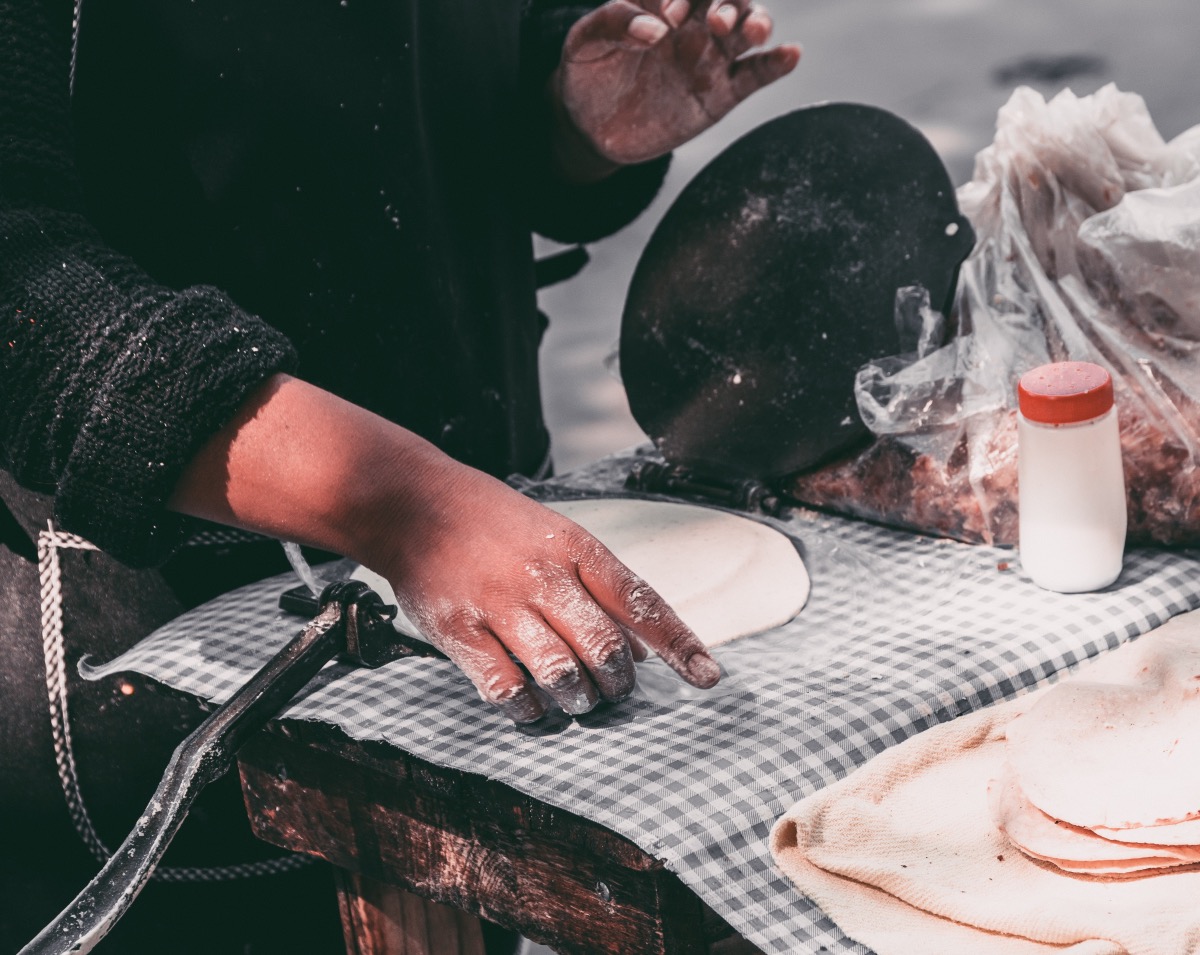Mexico City, Mexico
Thomson Reuters Foundation
Business at Marco Antonio Jimenez’s taco stall in Mexico City was just starting to recover from repeated COVID-19 lockdowns when global corn prices skyrocketed, sinking his sales once again.
The surge in the cost of corn – which is used to make Mexico’s staple tortilla – forced Jimenez to raise the price of his tacos by two pesos (10 US cents), but he said many of his mainly low-income customers could no longer afford the 20-peso snack.
“When the price of tortillas increases, I have to increase the price of tacos,” Jimenez, 26, told the Thomson Reuters Foundation.
“Many people prefer not to buy anything anymore,” he said.

Making tortillas in Mexico. PICTURE: Dennis Schrader/Unsplash.
The conflict in Ukraine has hit global grains and fertilizer supplies, contributing to a jump of almost 20 per cent in global corn prices between February and March and taking them to a nine-year high in April, according to World Bank data.
Ukraine is the world’s number four corn supplier, while seven Latin American countries were among the 20 biggest importers of the grain during 2021.
That fuels the threat of food poverty in a region where 267 million people have had to reduce the amount they eat since the start of the coronavirus pandemic, with many sometimes going hungry, said Carolina Trivelli, senior adviser for strategic analysis at the Food and Agriculture Organization.
Latin America had the biggest increase in food poverty globally between 2014 and 2020 due to the reduction of economic growth rates, extreme inequality and serious climate events that predated the pandemic, according to recent FAO statistics.
In Mexico, longer and more frequent droughts have forced farmers in some corn-growing areas to switch to less thirsty crops in recent years. Such factors mean the region is especially vulnerable to the impact of higher grains and fertilizer costs linked to the war in Ukraine, Trivelli said. Rising fertiliser prices can lead farmers to cut their usage, causing production to fall.
“We are seeing the perfect storm,” Trivelli said.
Jiovani Santiago, 34, who works at a tortilla shop on the northern fringe of Mexico City, said he sees first-hand how the everyday essential is becoming a luxury for some customers.
“I’ve seen the kilo of tortilla go up [from 18 pesos] to 22 pesos in the last month,” said Santiago.
“Now people have to buy less than they used to.”
Double-digit inflation
As the pandemic wreaked havoc on the region’s already weak economies, the prevalence of food insecurity rose to 40.9 per cent from 31.9 per cent between 2019 and 2020 in Latin America and the Caribbean, according to the latest FAO data.
Accelerated inflation is expected to push 7.8 million people more into food insecurity this year, according to new estimates released by the Economic Commission for Latin America and the Caribbean (ECLAC).
Food and drink inflation in six countries – Colombia, Paraguay, Mexico, Chile, Brazil and Uruguay – hit double digits in March, with women and people with informal jobs set to be hit hardest, ECLAC said.
“Food security must be a priority. For that, international food and fertiliser commerce must not be restricted, as that would accelerate inflation and damage the poorest,” Mario Cimoli, acting executive secretary of the UN agency, told a recent news conference.
Central American countries such as Guatemala and Honduras, which rely on corn-based foods like tamales and pupusas, are particularly at-risk from rising grains prices after the 2020 hurricanes Eta and Iota wrecked crops and exacerbated hunger.
Caribbean countries, which are heavily dependent on imported grains and fuel, are also threatened by food insecurity due to an increase in debt burdens during the pandemic, said Trivelli.
We rely on our readers to fund Sight's work - become a financial supporter today!
For more information, head to our Subscriber's page.
Social unrest
Alarmed about the impact on consumers, governments are taking emergency measures to rein in inflation.
Mexico has suspended import duties for a year on a range of essential goods including corn, while Argentina – where inflation could top 70 per cent this year – proposed a bill this month to tax companies that earn “extraordinary income” as a result of fallout from the war in Ukraine – mainly commodities firms.
During the Summit of the Americas in early June, the Biden administration pledged $US331 million in funding for food security in El Salvador, Guatemala, Honduras, Haiti and Colombia.
However, analysts say the food crisis looks set to last until well into 2023, calling for public policies such as direct welfare payments or school lunch programs to help the poorest.
“We need a package of temporary and focalised social policies for the most vulnerable populations and measures to support food production,” said Trivelli.
The jump in food prices also fans the risk of social unrest in countries including Brazil and Argentina, according to a recent report by international risk consultants Verisk Maplecroft.
Idly waiting on his taco stand for the first customers of the day, Jimenez said he was worried about his rapidly dwindling income, which has dropped from 10,000 pesos to 7,000 in a matter of weeks.
“We’re being attacked on all fronts. Meat, eggs, even electricity has gone up,” he said. “Since the pandemic we haven’t had a chance to recover.”





